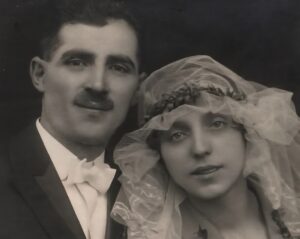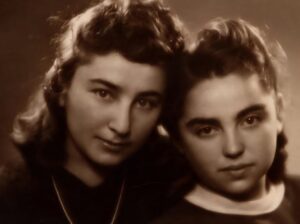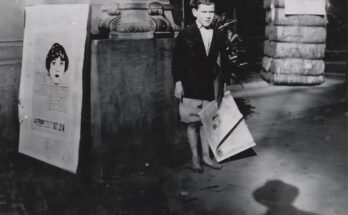Helena Meislová was born in what is now the Czech Republic, into a Jewish family rooted in the cultural and intellectual traditions of Central Europe. She lived during a time when Czechoslovakia was a thriving democracy with a proud Jewish community that contributed to the country’s vibrant civic and cultural life. As a wife and mother, Helena built a home with her husband Ota, and together they raised two daughters, Vlasta and young Helena. The family lived an ordinary yet meaningful life—one of love, tradition, and hope for the future.

But that life was shattered by the rise of Nazi Germany and the occupation of Czechoslovakia in March 1939. With the creation of the Protectorate of Bohemia and Moravia, the Jewish population came under immediate threat. Anti-Jewish laws quickly followed, stripping Jewish citizens of their rights, their property, and their place in society. Like thousands of other Czech Jews, Helena and her family were forced from their home and sent to the Theresienstadt ghetto, a Nazi transit camp and propaganda tool disguised as a “model” Jewish settlement.
Theresienstadt was a deeply deceptive place. Though it was presented by the Nazis as a self-governing Jewish town, it was in reality a ghetto marked by overcrowding, hunger, disease, and fear. Families like Helena’s tried to maintain a sense of normalcy amid the growing despair, holding on to their identity and dignity. Yet for most, Theresienstadt was only a temporary stop on the way to the extermination camps. On 6 September 1943, Helena, Ota, and their daughters were deported from Theresienstadt to Auschwitz—a journey from illusion to the heart of Nazi genocide.

The transport to Auschwitz would have taken place in sealed freight cars, inhumanly packed with people of all ages. For Helena and her family, the fear and confusion must have been overwhelming. At Auschwitz, the Nazi system of selection awaited: arriving prisoners were immediately divided into those deemed fit for forced labor and those marked for immediate death. Families were torn apart in seconds. Children, the elderly, and mothers with small children were almost always sent straight to the gas chambers.
None of the Meislová family survived. Helena, her husband Ota, and their daughters Vlasta and Helena were all murdered, likely upon arrival. For the Nazis, their lives were reduced to numbers on a transport list and then erased. But they were more than victims—they were a family, bound together in love and fate, taken together in the machinery of the Holocaust. Their deaths echo the broader tragedy of Czech Jewry, of families destroyed and communities erased from the map.
The murder of Helena and her family is a reminder of how the Holocaust was not just a crime against individuals, but against entire families, entire futures. Every child murdered, like young Helena and Vlasta, represented a generation that would never come to be. Every parent, like Helena and Ota, took with them hopes, dreams, and stories never told. The Nazis sought to destroy not only Jewish lives, but Jewish legacy, memory, and humanity itself.
Today, remembering Helena Meislová and her family is a solemn act of historical justice. Their names are preserved in the records of Theresienstadt and Auschwitz, in memorial books, and in the testimony of survivors who carried forward the duty to remember. Their story is part of the collective memory of a genocide that claimed six million Jewish lives—but also of the resistance of memory against erasure.
By remembering Helena Meislová, we affirm that history must be told, that lives must be named, and that humanity must never again allow such hatred to take root. She, Ota, Vlasta, and Helena were a family. They lived, they loved, and they mattered. Their story, and those of millions like them, must never be forgotten.


